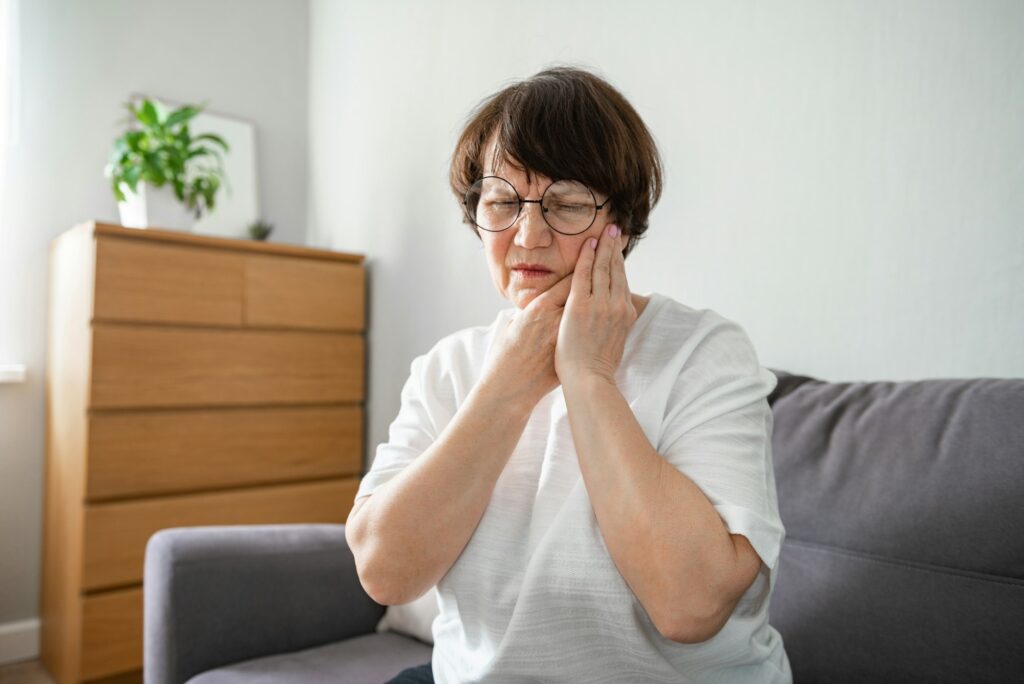If you’re struggling with poor sleep, chronic nasal congestion, or sinus infections, you might be surprised to learn how deeply connected these issues are. Obstructive sleep apnea (OSA) and sinus health share more than just your airway. They often fuel each other in a frustrating cycle of congestion, fatigue, and interrupted breathing.
At Houston Sleep Associates, we frequently see patients with overlapping symptoms of sleep apnea and sinusitis. Addressing both can dramatically improve your breathing, energy, and overall quality of life.
What Is the Relationship Between Sinusitis and Sleep Apnea?
The connection between sinusitis and sleep apnea lies in your airway. When your nasal passages are blocked due to inflammation or infection, your body shifts to mouth breathing, especially at night. This reduces airway stability and increases the risk of sleep apnea episodes.

Likewise, sleep apnea can lead to inflammation and pressure buildup in the upper airways, which worsens sinus drainage and can make sinus infections more frequent and intense.
What Is Sinusitis?
Sinusitis refers to inflammation of the sinuses, hollow cavities around the nose and eyes. It can be:
- Acute (short-term, often viral or bacterial)
- Chronic (lasting 12 weeks or more, with ongoing inflammation)
Symptoms include:
- Nasal congestion
- Facial pressure or pain
- Headaches
- Mucus buildup or postnasal drip
- Reduced sense of smell
If you have sinusitis and also snore, gasp for air, or wake up frequently during the night, there’s a strong chance sleep apnea is involved.
Where Can I Get Treatment for My Sinusitis and Sleep Apnea in Houston?
At Houston Sleep Associates, we offer specialized evaluations for both sleep apnea and sinus-related sleep disturbances. We work closely with ENT specialists when needed to coordinate care that relieves your congestion and improves your oxygen flow at night.
Our sleep specialists provide:
- Sleep apnea diagnostics (including home sleep testing)
- Custom oral appliance therapy
- Referrals for sinus imaging or ENT consultations
- Guidance on lifestyle and breathing improvements
Treating both conditions together gives patients the best chance of achieving long-term relief and a truly restful sleep.
The Impact of Sinus Disease on Sleep
When your sinuses are inflamed or infected, sleep quality tends to suffer. Here's how sinus issues can interfere with rest—and how they often worsen obstructive sleep apnea:
Evaluation
A proper diagnosis is key. Sinus imaging, endoscopy, and sleep testing can reveal the extent of airway obstruction and guide treatment.
Antibiotics
For bacterial sinus infections, antibiotics may be prescribed to clear the infection and reduce inflammation, making nasal breathing easier.
Nasal Congestion
Swollen sinus tissues make it difficult to breathe through your nose. This promotes mouth breathing, which destabilizes your airway and worsens snoring and apnea.
Nasal Irrigation
Using a saline rinse or neti pot can help clear mucus and allergens, opening your nasal passages and improving airflow.
Decongestants
Short-term use of nasal sprays or oral decongestants can reduce swelling, but prolonged use should be avoided without medical supervision.
Allergen Management
Allergies often trigger both sinus inflammation and sleep apnea. Reducing exposure to dust, pollen, or pet dander can help relieve symptoms.
Increased Inflammation
Sleep apnea causes intermittent drops in oxygen, which trigger inflammation throughout the body, including the sinuses. This creates a feedback loop that worsens both conditions.
Poor Sleep Quality
Blocked sinuses disrupt deep sleep cycles. Many patients report restless nights, daytime fatigue, and brain fog when dealing with chronic sinusitis.
Pressure Changes
Sinus inflammation can also cause pressure changes in the head and ears, making it harder to relax and fall asleep comfortably.
Oral Appliance Therapy
One of the most effective, non-invasive treatments for sleep apnea-related breathing issues is oral appliance therapy. At Houston Sleep Associates, we create custom-fitted devices that:
- Gently reposition the jaw and tongue
- Keep the airway open throughout the night
- Improve oxygen flow and reduce apneic events
- Help patients who can’t tolerate CPAP therapy
Patients often report reduced snoring, easier breathing, and improved sinus pressure relief once they begin using their oral appliance.
Conclusion
Sleep apnea and sinus problems often co-occur, and if you're dealing with both, treating just one won’t fully resolve the issue. A comprehensive approach that addresses nasal obstruction, inflammation, and airway collapse is key to restoring restful, uninterrupted sleep.
At Houston Sleep Associates, we treat the whole picture, not just the symptoms. Whether your problem starts in your sinuses, your sleep patterns, or both, we’re here to help you breathe better, sleep deeper, and wake up energized.
💤 Don’t Let Sinus Congestion or Sleep Apnea Disrupt Your Life
Schedule a consultation with Houston Sleep Associates today to get answers and solutions that work for you.
👉 Book Your Sleep Evaluation Now

